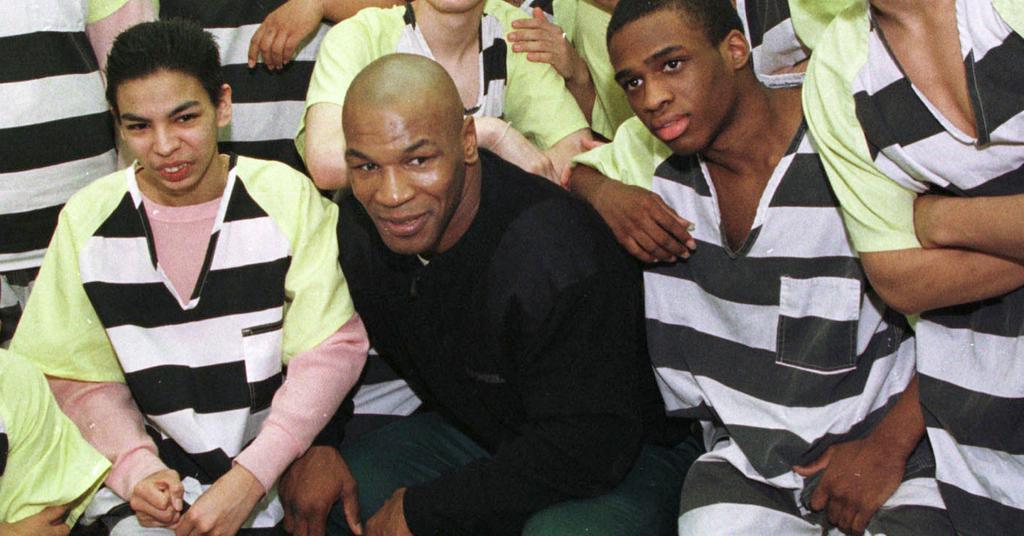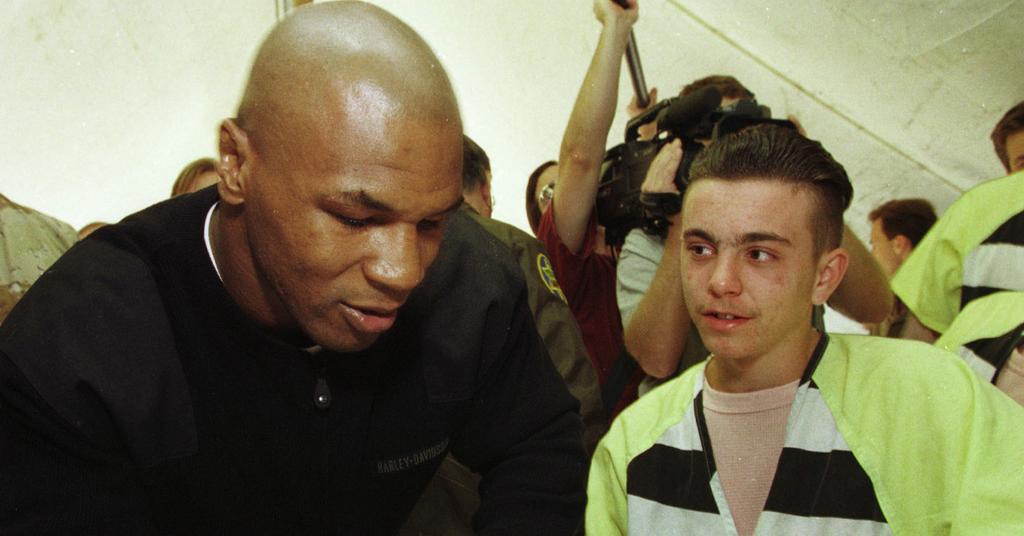Mike Tyson's Prison Sentence: The Shocking Truth And Aftermath
Why did "Iron Mike" Tyson, a name synonymous with boxing dominance, find himself behind bars? The story of Mike Tyson's imprisonment is a stark reminder that even the most formidable figures can face devastating falls from grace, a narrative that continues to captivate and confound.
The saga began in Indianapolis. The events of July 1991, at the Canterbury Hotel, would set in motion a series of events that would forever alter the trajectory of one of boxing's most celebrated champions. Accusations of rape, leveled by Miss Black America contestant Desiree Washington, led to a highly publicized trial and, ultimately, a guilty verdict. This verdict, delivered by an Indianapolis jury on February 10, 1992, marked a significant turning point in Tysons life.
| Full Name: | Michael Gerard Tyson |
| Born: | June 30, 1966 (Age 57) |
| Nationality: | American |
| Nickname(s): | "Iron Mike", "Kid Dynamite", "The Baddest Man on the Planet" |
| Boxing Record: | 50 Wins (44 by KO), 6 Losses, 0 Draws, 2 No Contests |
| Weight Division: | Heavyweight |
| Years Active: | 1985-2024 |
| Notable Achievements: | Youngest Heavyweight Champion (20 years old), Undisputed Heavyweight Champion |
| Legal Issues: | Conviction of Rape (1992), Registered Sex Offender |
| Imprisonment: | Sentenced to six years in prison in 1992; Released on parole in 1995 after serving less than three years. |
| Key Figure(s): | Cus D'Amato (Trainer and Manager) |
| Reference: | Wikipedia |
The initial sentencing on March 26, 1992, handed down by Judge Patricia Gifford, was a ten-year prison term. However, the judge suspended four years of the sentence, ultimately reducing Tyson's time behind bars to six years. This was a major blow for Tyson, who initially faced the prospect of up to 69 years in prison.
- Skymovieshd Features Security Alternatives Is It Safe
- Sky Cinema Bollywood News Latest Movies Streaming More
The case had far-reaching implications. The incident itself, and the subsequent trial, were heavily covered by the media. The trial's dramatic nature, coupled with Tysons celebrity, guaranteed that the outcome would be a major news story. Ultimately, the jury found Tyson guilty, a decision that sent shockwaves through the sports world and beyond. While Tyson maintains his innocence to this day, the verdict stood.
The former boxer was sent to the Indiana Youth Center, now known as the Plainfield Correctional Facility. Inside, Tyson, a man accustomed to the glitz and the clamor of the boxing world, faced a new and harsh reality. The transition from a life of privilege and fame to the confines of prison was undoubtedly jarring. Stories abound of the challenges he faced. The fact that he would serve less than half of his sentence speaks volumes about the complex legal and social landscape he found himself in.
Released on parole in 1995, after serving less than three years of his sentence, Tyson's freedom came with strings attached. One of the conditions for parole in Indiana at the time was passing the General Educational Development (GED) test. He was also required to register as a sex offender for life, a consequence that remains a part of his public persona. The Florida Department of Law Enforcement, like other agencies, still lists him on its sex offender registry, a constant reminder of his conviction.
- Best Vegamoviesmen Alternatives Free Movie Sites 2024
- Lovely Runner Stars Chemistry Rumors Romance Latest News
The implications of the conviction went beyond imprisonment. As part of the conviction, Tyson was required to register as a sex offender for the rest of his life, a consequence that remains a part of his public persona. This registration is a legal mandate that comes with specific requirements and restrictions, varying by state. The designation significantly impacts a person's life, affecting where they can live, work, and interact with others.
Tyson's legal team, during the trial, made certain arguments. They pointed to a previous sexual partner of Washington's, who had been falsely accused of rape in 1989, attempting to sow doubt in the jury. The defense tried to paint a picture of reasonable doubt, but ultimately, the jury was not persuaded.
During his time in prison, Tyson found himself in the position of having to navigate the internal dynamics of the prison system. There were fights, confrontations, and the constant threat of violence. In an interview, Tyson himself recounted the experience, revealing that he fought someone while in prison, a reflection of the hostile environment.
The incident that led to Tyson's conviction occurred in July 1991. Desiree Washington, a Miss Black America contestant, accused Tyson of rape after an encounter at the Canterbury Hotel in Indianapolis. These allegations led to a full-blown investigation and subsequent charges. The trial's outcome sent shockwaves through the boxing world and beyond, marking a dramatic fall for one of the sport's most celebrated figures.
The verdict and subsequent sentencing were a significant blow, but the events that unfolded in the aftermath provide additional insights into Tyson's life. His parole, his public appearances, and his continued career in boxing all reflect the complex character of a man who has overcome adversity, though not without scars.
The events surrounding Mike Tyson's imprisonment are a reminder of the complexities of the legal system, the impact of fame, and the enduring nature of human resilience. His story is a lesson, filled with twists and turns, triumphs and tragedies.
He has often spoken about his time in prison. In a video, posted on social media, Tyson reflected on the experience: "I had the best three years of my life in prison." This seemingly contradictory statement reveals a deeper understanding of his personal growth. It showcases how Tyson may have used his imprisonment as an opportunity for introspection and self-improvement.
The case highlighted the importance of legal representation. Tyson's legal team worked to provide the best defense possible, and he was successful in having his sentence commuted. This underscores the importance of skilled advocacy in navigating the complexities of the legal system. This commutation, according to Tyson himself, was the result of his actions, reflecting his desire for freedom.
The contrast between the "Iron Mike" who dominated the boxing world in the 1980s, and the man who spent three years in prison, is vast. It is a testament to the transformative power of life-altering events. Tyson's story illustrates how an individual can fall from grace and yet, find a way to rebuild and redefine himself.
The story of Mike Tyson's time in prison serves as a case study, an analysis of the factors that led to his imprisonment, the details of his incarceration, and the ripple effects of his conviction. It is a narrative of legal proceedings, personal struggles, and the enduring human spirit.
The incident in July 1991 at the Canterbury Hotel remains a pivotal event. The events of that night, and the subsequent accusations by Washington, set in motion a chain of events that would lead to a significant period of Tyson's life spent behind bars.
The final sentence of six years, reduced from an initial ten, provided an understanding into the intricacies of the legal system. However, even with the reduced sentence, the implications for Tyson were profound. Beyond the loss of freedom, the conviction carried with it social stigma, career ramifications, and the constant requirement to register as a sex offender. The process of re-integrating back into society was a challenge.
The conviction in Indiana, and the subsequent prison sentence, were a moment of reckoning. For a man who had dominated the boxing world, this marked a dramatic chapter in his life. His story is a testament to the complexities of celebrity, the legal system, and the enduring strength of the human spirit.



Detail Author:
- Name : Barbara Kihn DVM
- Username : mathilde16
- Email : zvonrueden@robel.com
- Birthdate : 2007-05-03
- Address : 2116 Weimann Plains Wiegandtown, IN 25271-1200
- Phone : 478-712-2971
- Company : Schuppe, Greenholt and Beatty
- Job : Press Machine Setter, Operator
- Bio : Autem est iusto facilis nisi. Est quia sit et et ex praesentium sapiente. Qui sit eos consequatur id porro numquam. Molestias nobis aut ea esse. Alias non quis nam architecto officiis sint.
Socials
linkedin:
- url : https://linkedin.com/in/ljenkins
- username : ljenkins
- bio : Placeat nihil laboriosam eligendi quam voluptate.
- followers : 5559
- following : 2979
tiktok:
- url : https://tiktok.com/@laurel.jenkins
- username : laurel.jenkins
- bio : Nobis consequuntur iure voluptatem commodi fugiat ipsam corporis.
- followers : 4032
- following : 1610
facebook:
- url : https://facebook.com/laurel_jenkins
- username : laurel_jenkins
- bio : Exercitationem deleniti recusandae iure.
- followers : 1872
- following : 1985
twitter:
- url : https://twitter.com/jenkinsl
- username : jenkinsl
- bio : Consequatur ut sit maxime voluptate impedit hic. Iste at deleniti voluptatibus similique quis. Aut aut atque illo mollitia est ut.
- followers : 818
- following : 1886
instagram:
- url : https://instagram.com/ljenkins
- username : ljenkins
- bio : Suscipit blanditiis odio corrupti vel. Velit odio in cumque qui omnis.
- followers : 2593
- following : 708